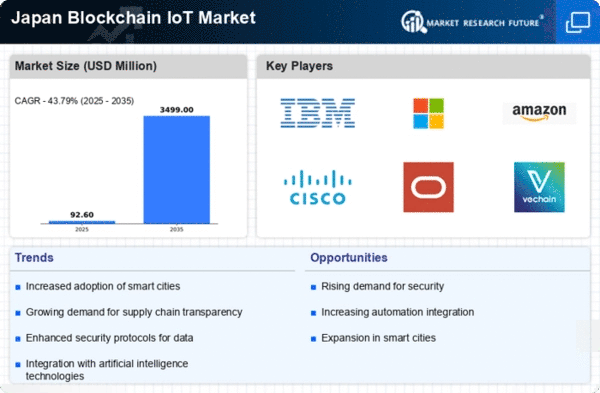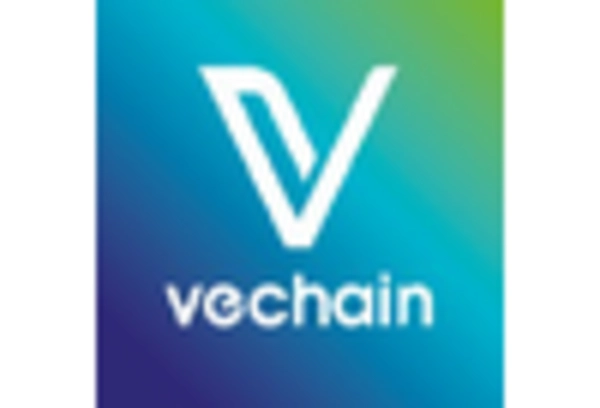Rising Demand for Supply Chain Transparency
The Blockchain IoT market in Japan is experiencing a notable surge in demand for enhanced supply chain transparency. This trend is driven by the need for businesses to track products from origin to consumer, ensuring authenticity and reducing fraud. In 2025, it is estimated that approximately 30% of Japanese companies will implement blockchain solutions to improve traceability in their supply chains. The integration of IoT devices with blockchain technology allows for real-time data sharing, which is crucial for maintaining transparency. As consumers become more conscious of product origins, the blockchain iot market is likely to expand, providing innovative solutions that meet these demands.
Increased Focus on Data Security and Privacy
As concerns regarding data security and privacy escalate, the blockchain iot market is witnessing a heightened focus on secure data management solutions. In Japan, where data breaches have significant repercussions, businesses are increasingly turning to blockchain technology to safeguard sensitive information. By leveraging decentralized networks, companies can enhance data integrity and reduce the risk of unauthorized access. It is projected that by 2025, around 40% of enterprises in Japan will adopt blockchain solutions to bolster their data security measures, thereby propelling the blockchain iot market forward.
Government Initiatives Supporting Blockchain Innovation
The Japanese government is actively promoting the adoption of blockchain technology, which significantly impacts the blockchain iot market. Initiatives such as funding for research and development, as well as regulatory frameworks that encourage innovation, are paving the way for new applications. In 2025, government-backed projects are expected to contribute to a 25% increase in blockchain-related startups in Japan. These initiatives not only foster a conducive environment for technological advancements but also enhance collaboration between public and private sectors, thereby driving the growth of the blockchain iot market.
Emergence of Smart Cities and Infrastructure Development
The concept of smart cities is gaining traction in Japan, which is likely to drive the blockchain iot market. As urban areas evolve, the integration of IoT devices with blockchain technology can facilitate efficient management of resources, transportation, and public services. In 2025, investments in smart city projects are expected to reach $10 billion, with a significant portion allocated to blockchain applications. This development not only enhances urban living but also creates a robust ecosystem for the blockchain iot market, fostering innovation and collaboration among various stakeholders.
Growing Interest in Decentralized Finance (DeFi) Solutions
The Blockchain IoT market is also influenced by the rising interest in decentralized finance (DeFi) solutions in Japan. As traditional financial systems face challenges, businesses and consumers are exploring blockchain-based alternatives that offer greater accessibility and efficiency. In 2025, the DeFi sector is projected to grow by 50%, with many Japanese firms integrating IoT devices to streamline financial transactions. This shift towards decentralized financial systems is likely to create new opportunities within the blockchain iot market, as companies seek to leverage the benefits of both technologies.
















